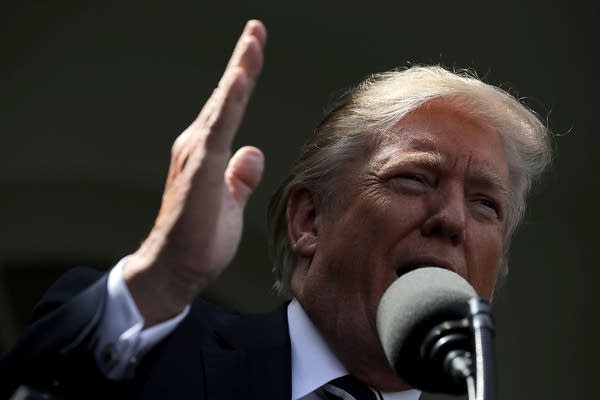Trump signs order disbanding voter fraud commission

Go Deeper.
Create an account or log in to save stories.
Like this?
Thanks for liking this story! We have added it to a list of your favorite stories.
Updated: 7:10 p.m. | Posted: 6:25 p.m.
President Donald Trump has signed an executive order disbanding his controversial voter fraud commission amid infighting, legal threats and information denials.
The White House blamed the decision, announced Wednesday evening, on a refusal by more than a dozen states to comply with the commission request for reams of personal voter data, including voters' names, voting histories and party affiliations.
Turn Up Your Support
MPR News helps you turn down the noise and build shared understanding. Turn up your support for this public resource and keep trusted journalism accessible to all.
"Rather than engage in endless legal battles at taxpayer expense, today President Donald J. Trump signed an executive order to dissolve the Commission, and he has asked the Department of Homeland Security to review its initial findings and determine next courses of action," White House spokeswoman Sarah Huckabee Sanders said in a statement.
Critics saw the commission as part of a conservative campaign to make it harder for poor people and minority voters to access the ballot box, and to justify unfounded claims made by Trump that voter fraud cost him the popular vote in 2016.
Trump has repeatedly alleged, without evidence, that 3 million to 5 million people voted illegally in the 2016 election, delivering the popular vote to his Democratic rival, Hillary Clinton.
Past studies have found voter fraud to be exceptionally rare.
Critics also viewed the commission as an attempt to distract from the ongoing investigations into Russian election meddling and potential collusion between Moscow and Trump campaign aides. The intelligence community concluded that the Russian government mounted a campaign to help Trump win.
At least a dozen states, plus Washington, D.C., had rebuffed the commission's request for voter data, citing privacy concerns and a fear that complying would legitimize the idea that voter fraud is widespread.
While there have been isolated cases of people voting illegally, and many voter rolls often contain outdated data, there is no evidence voter fraud is a widespread problem in the United States or has impacted election results.
A study by a Loyola Law School professor found that out of 1 billion votes cast in all American elections between 2000 and 2014, there were only 31 known cases of impersonation fraud.
Trump, during the commission's first meeting, questioned the motives of states that refused to comply with the commission's requests, suggesting they had something to hide.
Voter advocacy groups and Democrats applauded the development.
"President Trump created his sham voting commission to substantiate a lie he told about voter fraud in the 2016 election. When he couldn't come up with any fake evidence, and under relentless pressure, he had no choice but to disband his un-American commission," said Let America Vote President Jason Kander in a statement.
Kander added, "Good riddance."


